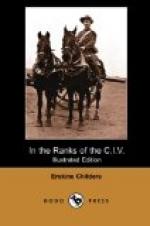By the way, this General Clements seems to be a myth, and the talk now is of Rundle and Ian Hamilton, who are supposed to be getting round De Wet from other quarters, while we drive him up this way into their arms. It is said we are going to Bethlehem. I forgot an important event of the evening in the arrival of a bag of mails, parcels only, brought by a convoy from Kroonstadt, which has just come in. To my delight I got one with a shirt and socks (which I at once put on over the others), cigarettes (a long exhausted luxury), Liebig, precious for evening soup, and chocolate, almost too good to eat for fear of getting discontented. We are on half rations of biscuit, which means three, and a tin of Maconochie each, a supply about enough to whet your appetite for one meal in a life like this, but it has to last the day of about seventeen hours. The ration is issued the night before, to eat as we please, and, of course, there is coffee soon after reveille, and tea in the evening. There is a cupful of porridge also with the coffee, paid for by deduction from our pay, so that one starts in good fettle. I don’t know why the whole column shouldn’t get fresh meat every day, for the country is teeming with cattle, which are collected and driven along with the column in huge herds. Many of the farmhouses are smoking ruins, the enemy, after annexation, being rebels according to law, and not belligerents; but it seems to me that such a policy is to use a legal fiction for an oppressive end, for it is quite clear that this part of the Orange River Colony has never been conquered.[A]
[Footnote A: I leave this as I wrote it, but drivers are not politicians, and doubtless there were special circumstances, such as treachery, concealed arms or sniping, to justify what at the best must be a doubtful policy; for a burnt farm means a desperate farmer.]




